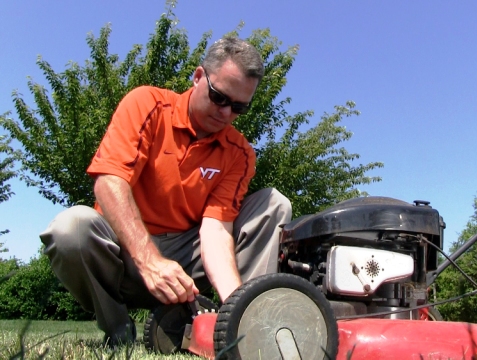
Imagine going home to a lush, environmentally friendly lawn that resembles the pristine Pete Dye River Course of Virginia Tech, home of the university’s golf team.
Now, you can.
A new video series produced by Virginia Tech’s College of Agriculture and Life Sciences and Virginia Cooperative Extension titled “A lawn to Dye for” helps homeowners create their own signature lawn without harming the environment. In a series of seven videos, Virginia Tech’s head golf coach Jay Hardwick teams up with the university’s turfgrass experts to provide tips on every aspect of lawn care, from initial seeding to proper watering techniques. The videos also show how managing lawn clippings and fertilizers can help curb water pollution.
The free videos can be found on Virginia Cooperative Extension’s Turf and Garden Tips website, and are also available in the college’s iTunes U collection.
“Our videos outline specific ways to create and sustain beautiful lawns without straining wallets or damaging the environment,” said Mike Goatley, Extension turfgrass specialist and professor in Virginia Tech’s Department of Crop and Soil Environmental Sciences. “For example, people often think the answer to improving a lawn is to add more fertilizer, but more is not necessarily better. Too much fertilizer, combined with run-off from sprinklers and rain, can dump chemicals into watersheds and pollute the water.”
Virginia Tech Turfgrass Research Center is home to some of the most cutting-edge work on new varieties of grass and methods for homeowners to care for their lawns. The new videos offer another way for the public to take that expertise home.
“By making smart choices, you can have a championship lawn that will be the envy of your neighbors,” Hardwick said. “And you will take an active role in protecting our environment – one stroke at a time.”
The videos cover a variety of lawn care topics, including the following:
- Testing soil;
- Selecting grasses;
- Watering;
- Mowing;
- Lawn diseases;
- Insects; and
- Weeds.
For more lawn management strategies, visit Virginia Cooperative Extension’s Turf and Garden Tips website.
Nationally ranked among the top research institutions of its kind, Virginia Tech’s College of Agriculture and Life Sciences focuses on the science and business of living systems through learning, discovery, and engagement. The college’s comprehensive curriculum gives more than 3,100 students in a dozen academic departments a balanced education that ranges from food and fiber production to economics to human health. Students learn from the world’s leading agricultural scientists, who bring the latest science and technology into the classroom.
Virginia Cooperative Extension brings the resources of Virginia’s land-grant universities, Virginia Tech and Virginia State University, to the people of the commonwealth. Through a system of on-campus specialists and locally based educators, it delivers education in the areas of agriculture and natural resources, family and consumer sciences, community viability, and 4-H youth development. With a network of faculty at two universities, 107 county and city offices, 11 agricultural research and Extension centers, and six 4-H educational centers, Virginia Cooperative Extension provides solutions to the problems facing Virginians today.


